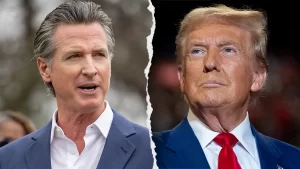Tax Cuts for the Wealthy: Unraveling the Liberal Labyrinth of Misunderstanding
Ah, tax cuts for the wealthy—a topic that has Democrats scratching their heads and Republicans reaching for their calculators. Brace yourselves, because we’re about to embark on a sarcastic and witty journey into the world of tax policy, Republican-style. Get ready for some humor, some facts, and a dash of playful antagonism for those “crazy” Democrats.

Ah, tax cuts for the wealthy—a topic that has Democrats scratching their heads and Republicans reaching for their calculators. Brace yourselves, because we’re about to embark on a sarcastic and witty journey into the world of tax policy, Republican-style. Get ready for some humor, some facts, and a dash of playful antagonism for those “crazy” Democrats.
“FOUR MORE YEARS” President Trump’s State of the Union T-Shirt
$17.99 – $30.00 $“Go Back To California!” Uncle Sam Political T-Shirt – www.CrazyDemocrat.com
$24.95 – $29.95 $“I may be crazy…But at least I’m not a Democrat”
$48.00 – $52.50 $
1. Tax Cuts for the Wealthy: An Elite Affair: Let’s start by addressing the elephant in the room—the notion that tax cuts for the wealthy are a sinister plot to fill the pockets of the elite. It’s almost as if those “crazy” Democrats believe that wealthy people swim in pools of money like Scrooge McDuck. In reality, tax cuts can stimulate investment, create jobs, and yes, even benefit regular folks.
2. Trickle-Down Economics: Splashing in Pools of Cash: Ah, trickle-down economics—a term that’s thrown around like confetti at a Democratic convention. But think about it: if the wealthy are the ones investing and building businesses, isn’t it logical that some of that wealth will flow down to the rest of us? It’s like a financial waterfall, and who doesn’t love a good splash?
3. The Secret to Wealthy Tax Cuts: Unicorn Horns and Fairy Dust: Democrats often suggest that tax cuts for the wealthy are as mythical as a unicorn horn or fairy dust. But Republicans know better—it’s about encouraging economic growth. Lower taxes can lead to more investment and job creation, which benefits everyone, even if it doesn’t involve mythical creatures.
4. The Lament of the Liberal Left: Tax Fairness Crusaders: Democrats are often the champions of “tax fairness,” but what’s fair about punishing success? It’s like saying, “Hey, you worked hard and achieved your dreams—now hand over your wallet!” Republicans believe in letting individuals keep more of what they earn and fostering an environment where everyone has the opportunity to succeed.
5. Economic Prosperity, Not Wealthy Witchcraft: At the end of the day, tax cuts for the wealthy aren’t a mysterious form of sorcery. They’re an economic strategy aimed at boosting prosperity for all. It’s about empowering individuals and businesses to thrive and create a rising tide that lifts all boats.
Conclusion: Tax Cuts and the Art of Political Banter: In the world of politics, tax policy can be as convoluted as a funhouse maze, with both sides convinced they have the right path. While we’ve poked a little fun at our “crazy” Democratic friends, the debate over tax cuts for the wealthy is a serious one. It’s essential to approach it with humor, facts, and a healthy dose of respectful disagreement.
So, whether you’re a dyed-in-the-wool Republican or just someone looking for a chuckle in the midst of the political storm, remember that even in politics, there’s room for a bit of sarcasm, wit, and the occasional friendly jab. Tax cuts for the wealthy may remain a contentious issue, but let’s keep the conversation lively and the debate respectful—it’s the Republican way!
Want Free Stuff? Visit 2000Freebies.comADDITIONAL RESOURCES & INFORMATION
- Tax Policy Center – Wealth and Taxes: https://www.taxpolicycenter.org/briefing-book/how-do-taxes-differ-across-income-groups
- Economic Policy Institute – Income and Wealth Inequality: https://www.epi.org/indicators/income-and-wealth-inequality/
- The New York Times – Wealthy Avoid Taxes: https://www.nytimes.com/interactive/2022/03/10/business/taxes-avoid.html
- Center on Budget and Policy Priorities – Tax Policy and Inequality: https://www.cbpp.org/research/federal-tax/policy-basics-federal-taxes-help-reduce-income-inequality
- Brookings Institution – Wealth Inequality and the Role of Taxes: https://www.brookings.edu/research/wealth-inequality-and-the-role-of-taxes/








